Exclusive School Rates
| Ticket Type | Standard | Super Peak |
|
Student (Admission per pupil) |
£15 |
£27 |
| Additional teachers (per teacher) |
£27 |
£27 |
These rates are applicable to both UK and international primary, secondary, college and higher education (18+ College/University). Higher Education group bookings must be a minimum of 10 people & each individual must show valid Student identification. Free Teacher Ratio (primary 1:5/secondary 1:10).
Prices may be subject to change, and we retain the right to change prices at any time. Please scroll to below to view the 'Rate Calendar' for off peak, peak and super peak dates throughout the 2025/2026 academic year.
Book a school trip2025/2026 Academic Year Rate Calendar
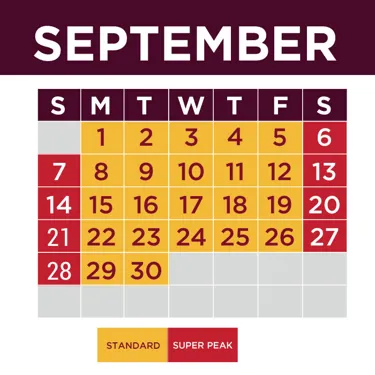
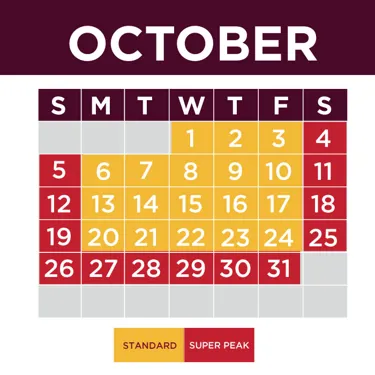
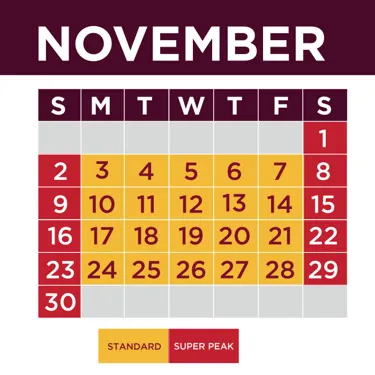
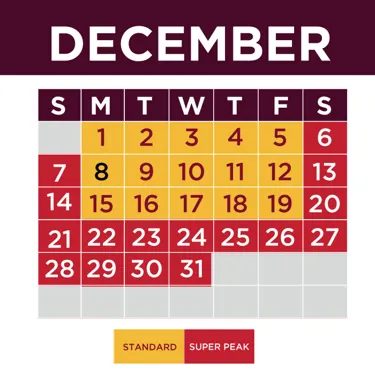
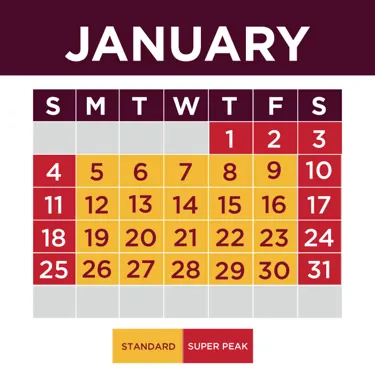
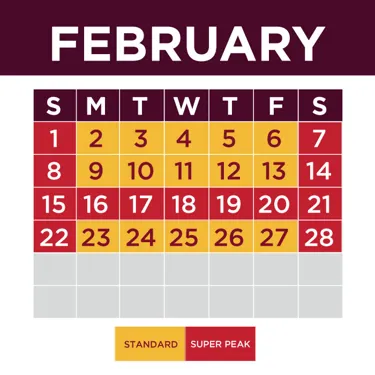
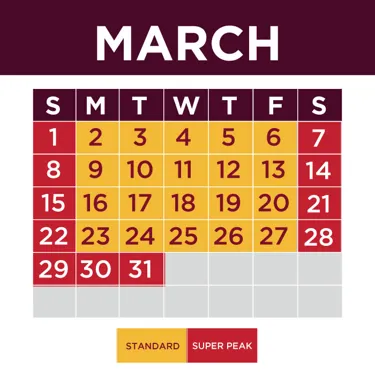
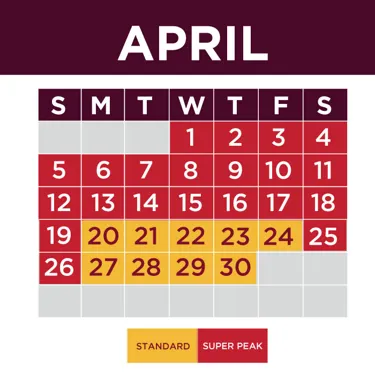
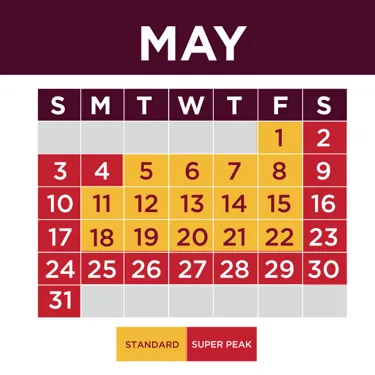
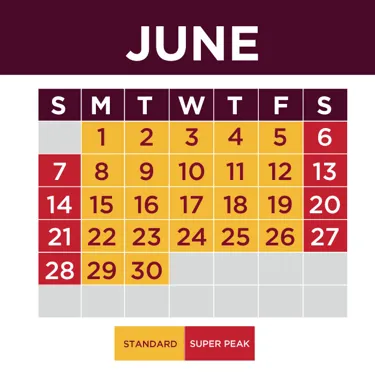
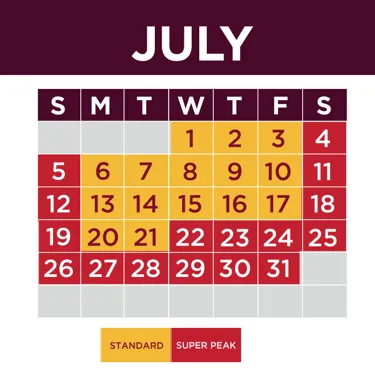
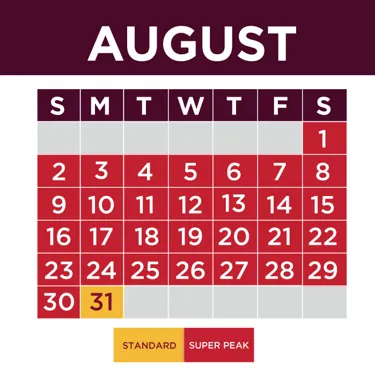
| Student Age | Ratios |
| Primary (5-11 Years Old) | 1 Free Teacher/Assistant to 5 Primary students |
| Secondary/College (11-18 Years Old) | 1 Free Teacher/Assistant to 10 Secondary/College Students |
When you make a booking, our team will assess the number of free teachers tickets based on the total student count. For instance, if there are 30 primary students, you will be allocated 6 free teachers or assistants tickets.
For any additional teachers beyond this ratio, we offer a discounted entry price of £27 per extra teacher or adult.
If a child needs 1:1 support, we’ll exclude that child from the total guest count and calculate the free teacher ratio based on the remaining students. For example, if there are 21 primary students and 1 child requires 1:1 support, we will provide one carer and allocate 4 free teachers based on the 1:5 ratio for the remaining 20 students. Therefore, the total would be 21 students, 1 carer, and 4 free teachers.
Students requiring 1:1 support can receive complimentary tickets for their carers. When booking through our booking form, simply request the number of carer tickets needed, and our team will include them in your booking. If booking online, carer tickets must be reserved by contacting the team via this number 0207 487 0350. Please ensure carers bring a school letterheaded document signed by the Headmaster/Mistress stating how many children in the group require 1:1 support.
We recognize how crucial health and safety is, as well as the value of planning ahead for your visit. To assist in your preparations, we’re pleased to offer complimentary planning tickets for two teachers from your group. When making your reservations, please select the option for planning tickets. If you choose to book online, simply reach out to our team at 0207 487 0350.
When you arrive at the attraction for your planning visit, simply present your tickets to the admission team, along with your teacher ID to validate your tickets.
Please note that you can only book the planning tickets Mon - Fri during term time and the planning tickets are only valid for the specific date and time booked, and they cannot be transferred to another individual.
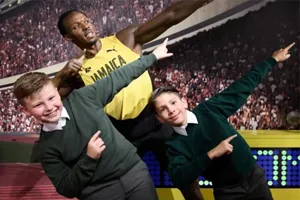
KS2/KS3 pupils have the opportunity to learn
In English…
- To identify the different types of media and their purposes.
- To explore and critique how the media present information and use language to create meaning.
- To understand the concept of ‘fake news’ and why it is important.
In PSHE and Citizenship…
- To understand how the media portrays young people and to recognise its possible impact.
- To explore how identity is affected by the media
Supporting Risk Assessment
Download our free risk assessment to support you in the writing of your own.
Planning Tickets
We offer school teachers two free planning tickets to come onsite pre-trip to plan lesson content, locate facilities, ask questions and carry out a risk assessment. You can request your preferred visit date when booking your school trip through the reservation form. The tickets will then be shared with you for your selected date on email.
FAQs
Visit our help centre for more information and frequently asked questions about a visit.
Classroom Learning
Get students inspired about their visit with our free activity packs and lesson plans with pre visit activity ideas for the classroom.
Learning Check Points
We would recommend students be prompted to complete ‘learning checkpoints’ or discussion points/tasks as they walk around the attraction; this will help guide and structure their learning through the various interactive and exciting zones. Just pick your theme and start exploring some example talking points on how your pupils learning experience could unfold!
Example discussion point 1: Children should consider the definition of fame. Would they like to be famous? Why/why not?
Example task 1: To review a list of some of the celebrities in the attraction and order them from most famous to least famous, giving reasons for choices. Who is on the A-List and who is on the B-List? How does it help children to define what we mean by ‘fame’?
Example discussion point 1: Ask children to consider what we mean by ‘celebrity culture’. What is our current celebrity culture? What role does the media play in this culture? Can we say that the media controls and defines this culture?
Example task 1: To imagine/create a private dialogue between two celebrities in Awards party. What would they say to each other? What would they have in common? Pupils should write an inner monologue for one or more of the celebrities, expressing how they really feel about the pressures of their celebrity status.
Example discussion point 2: Pupils should choose a celebrity and consider how they represent modern celebrity culture. How does their figure show the relationship between celebrity/fame and the media?
Example task 2: To create a selfie with a celebrity in A-list. What are the pressures when trying to create the perfect selfie? Why do people feel motivated to do it? How does it make them feel?
Example discussion point 1: Pupils should consider what it takes to be in the limelight as a fashion model, in front of millions of people. What personality traits are required? What are the challenges of this job?
Example task 1: To walk down the runway and record the different sensations of the experience using descriptive language and sensory description: sight, sound, touch, taste, smell.
** Pause/rest-bite**
Example discussion point 2: While children take a short break, they should watch how other visitors are interacting with the celebrities in the attraction. What do they notice?
Example task 1: To record observations of how members of the public interact with the attraction. What do they find interesting? What sorts of things do they do? What do they enjoy? Why do they enjoy it?
Example discussion point 1: Ask children to consider the term ‘fake news’. What does it mean? What different types of fake news are there?
Example task 1: To analyse a variety of news stories about one or more of the celebrities in the attraction (written/compiled specifically for the exercise) and to assess whether they think it is real or fake, picking out textual evidence to back up their decisions.
Example discussion point 2: Pupils should think about a recent election in the USA or the UK. Did fake news play a role in the election? How? Why is fake news dangerous when it comes to politics?
Example task 1: To write either a fake or a real headline in the style of a newspaper headline and swap it with other members of the class. Who is the best at spotting the fake news?
Example discussion point 1: Pupils should consider how fame has changed over time. How has the media contributed to these changes?
Example task 1: To analyse the fame experienced by The Beatles in the 1960s compared to the fame experienced by someone famous today. What is the same? Was it different?
Example discussion point 1: Pupils should be prepared before entry to the 4D cinema to consider how the experience engages them physically, mentally and emotionally – and why this is effective.
Example task 1: To create a new type of media for the future inspired by the experience in the 4D cinema.
Self-guided activity pack
Get students inspired during their visit with our free self guided careers focused activity pack.
FAQs
Visit our help centre for more information and frequently asked questions about a visit.
Classroom learning
Re-visit the experience and follow-up on learning with our free post visit lesson plans and activity pack.
Post visit activity pack
Get students inspired about their future after their visit with our careers focused activity pack.